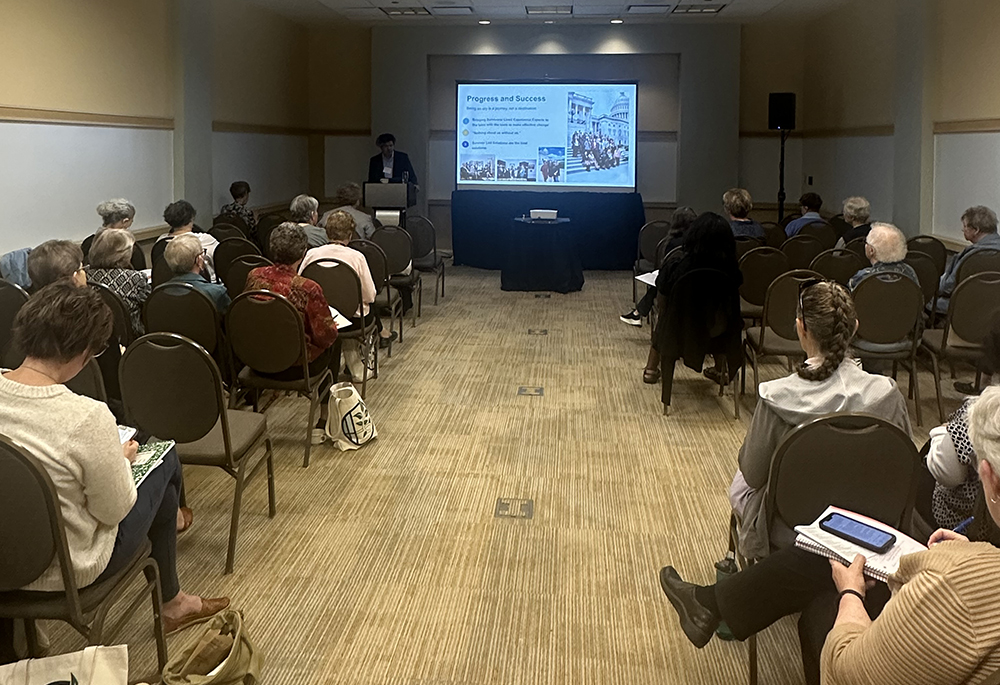
The Alliance to End Human Trafficking's 2023 conference took place Sept. 28-20 in Skokie, Illinois. "We like to come together with our membership to advocate in public policy, educate about the issues of human trafficking, and provide access to survivor services," said Katie Boller Gosewisch, executive director. "The conference really embraces all three aspects of our mission." (Vee L. Harrison)
On Sept. 28, the U.S. Catholic Sisters Against Human Trafficking modified the name to their organization, this time with a purpose that truly defined their mission.
The organization is now called Alliance to End Human Trafficking.
"It's best to stand for something, rather than to be against something," said the organization's executive director, Katie Boller Gosewisch, during a three-day conference in Skokie, Illinois. The conference, founded and supported by U.S. Catholic sisters, was organized to give survivors and supporters an outlet to educate and spread knowledge regarding human trafficking.
The mission of the Alliance to End Human Trafficking, according to its website, is to be "a collaborative, faith-based national network" offering education, supporting access to survivor services, and engaging in advocacy eradicating human trafficking. The root causes, according to the alliance, of human trafficking include systemic racism, neoliberal capitalism, climate change, poverty, war and conflict, forced migration, and gender inequality. According to Alliance to End Human Trafficking, human trafficking thrives due to an interconnected web of social injustice and human apathy.
During this year's Alliance to End Human Trafficking conference, advocates and survivors exchanged stories, resources, and most of all, solutions to help end global human trafficking. Attendees from various states joined together to learn more, and do more.
"We like to come together with our membership to advocate in public policy, educate about the issues of human trafficking, and provide access to survivor services," said Boller. "The conference really embraces all three aspects of our mission."
During Day 1, keynote speaker Mercy Sr. Angela Reed discussed human trafficking after the national impact of COVID-19. While presenting her slideshow, attendees around the room were engrossed in her lessons, and captive to the visceral feelings that came along with them.
"The human rights paradigm accentuates the exploited person at the center of any discussion," explained Reed. "Consider [human trafficking] to be human centric."
According to the 2023 Trafficking in Persons Report, an annual update on the state of global anti-trafficking efforts, there are three tiers that rank the issue of human trafficking as the entire nation's response to the problem.
Tier 1 refers to countries that are not necessarily free of trafficking, but are considered to be fully aligned with minimum standards to eliminate human trafficking. Tier 2 describes countries that are implementing substantial efforts to comply with standards. There's then a Tier 2 watchlist, which describes cases when the United States feels that their response to combat human trafficking is not aligned with the levels of trafficking in the country. And finally, the countries that identify as Tier 3 have not made any significant efforts to put an end to global human trafficking.
Speaker Alex Delgado, director of public policy at PACT, hosted a session titled "Survivor Engagement in Public Policy and Federal Legislation in the 118th Congress." During his session, he discussed the strides, or lack thereof, of legislation to help prevent human trafficking. He believes that the stories of survivors will help move the needle in Congress. However, obtaining those stories could be a challenge.
"I always tell survivors, they don't have to share their story. Survivor is not a job description," said Delgado. "When this work happens, sometimes the traumatization happens right away or it could happen a week later. Afterwards, some survivors would stay in bed for weeks, because it's so exhausting to even talk about the experience."
Advertisement
Other topics covered at the conference included public health approaches for prevention, the legalities of human trafficking, spiritual advocacy, the impact of human trafficking on LGBTQIA+ and youth and partnerships to end human trafficking.
While vulnerable populations continue to suffer in regards to global human trafficking, several multi-stakeholder approaches have been identified to address impacts of climate change on human trafficking. While the factor of climate change isn't an obvious relation to human trafficking, the impacts present parallels.
Climate change can be the cause of many individuals leaving their homes. For example, in the case of natural disasters, people can become more vulnerable to human trafficking. Silos are then a result of displacement.
Reports show that globally, there are over 40 million human trafficking victims each year. Traffickers are making billions of dollars as a result of human bodies. It has been coined as "modern slavery." Considering modern factors like the dark web, a part of the internet that isn't visible to search engines that requires the use of an anonymous browser, the crisis teaches us that there are even darker places promoting the trafficking of human bodies.
The Alliance to End Human Trafficking continues to offer educational resources including access to videos, podcasts, newsletters and reports. Survivor services usually come from survivors themselves. Additionally, through the organization, there is access to books, videos and scholarships. Their advocacy includes helping and supporting anti-trafficking legislation and shaping laws to do so. Faith resources from the organization include bulletins, monthly reflections, social teachings and faith-based orientations.
Cristian Eduardo, a member of the Survivor Advisory Council of Alliance to End Human Trafficking, said that including the voices of survivors is a very important part of the work to end human trafficking.
"A lot of times people who haven't experienced human trafficking really don't know what human trafficking looks like," said Eduardo. "We continue to see this in movies, and people think that trafficking only happens in movies, and in other countries, and to girls. By including survivors' voices, we get a real perspective of what human trafficking really is, and how we can better fight against it."





